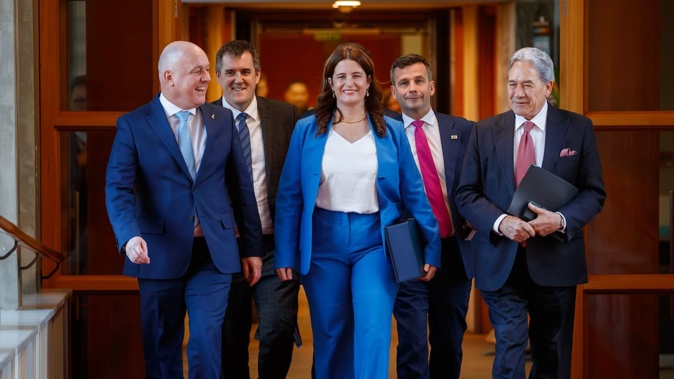
The National Party has failed to win voters over with its latest Budget, joining a long line of other parties who have endured a post-Budget poll slump.
The latest Taxpayers’ Union-Curia Poll put National’s support at 35.4 per cent, down 1.9 points. Coalition partner Act was up 0.3 points to 9.7 per cent, and NZ First was up 0.1 points to 5.6 per cent.
Those numbers would give the current Government 63 seats, down three from last month’s poll, but enough to govern.
Labour is down 0.6 points to 29.4 per cent, while Te Pāti Māori is up up 0.9 points to 4 per cent. The Greens are the biggest gainers of the poll, up 2.5 points to 12.7 per cent.
That would give the left-wing parties 58 seats, up two from the last poll. The poll assumes parties hold all current electorate seats, which assists Te Pāti Māori which would otherwise be out of Parliament.
Prime Minister Christopher Luxon has been dealt a blow in the favourability stakes, with his net favourability down to -5 per cent, putting him behind Chris Hipkins who rose this month to +3 per cent.
The figures continue an era of incredibly low popularity for all major party leaders, which is quite a change from the past, when leaders like Prime Minister Jacinda Ardern would enjoy double-digit favourability. She once polled as high as +31.7 per cent, only falling into single digits in April 2022.
Act leader David Seymour’s net favourability fell 11 points to -19 per cent and NZ First leader Winston Peters’ net favourability fell 14 points to -19 per cent.
Finance Minister Nicola Willis is the most liked of coalition ministers with a -3 per cent rating.
The cost of living remains the issue front of mind for voters, with 39 per cent ranking it among their top three issues. This was followed by health on 32 per cent, the economy on 25 per cent and education on 24 per cent.
Health has shot up the agenda. In February, just 7 per cent of respondents ranked it among their top political issues. Law and order has also increased in prominence. It was a top issue for 7 per cent of voters in February.
That figure has now increased to 22 per cent.
Thomas Coughlan is Deputy Political Editor and covers politics from Parliament. He has worked for the Herald since 2021 and has worked in the press gallery since 2018.
Take your Radio, Podcasts and Music with you









